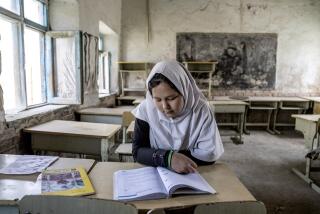Iran, world powers agree to draft deal on uranium
The head of the world’s atomic energy watchdog said Iran and world powers have until Friday to approve a proposed deal to transfer most of Iran’s nuclear material abroad to be reformatted for medical purposes.
International Atomic Energy Agency chief Mohamed ElBaradei disclosed no details about the draft deal, hammered out over 2 1/2 days of talks between Iranian, American, French and Russian diplomats in Vienna.
But he said that it reflected a “balanced approach” that would help Iran fuel a medical research reactor for diagnosing and treating cancer while building confidence to resolve long-standing suspicions about the nature of Tehran’s nuclear ambitions.
“Everybody who participated at the meeting was trying to help, trying to look to the future and not to the past, trying to heal the wounds that existed for many, many years,” ElBaradei told reporters. “I very much hope that people see the big picture, see that this agreement could open the way for a complete normalization of relations between Iran and the international community.”
Iran said it would take the proposal back to Tehran for consideration.
“We have had very constructive discussions, intensive discussions,” Iran’s envoy to the atomic energy agency, Ali Asghar Soltanieh, said after the meeting, according to news agencies. “There have been proposals. We had thorough discussions on these issues. We have to thoroughly study this text and have further elaboration in capitals and will come back and reflect.”
Iran’s drive to master nuclear technology has worried the West and Israel, the Middle East’s sole atomic power. Physicists say Iran has produced more than enough reactor-grade nuclear material to convert into a single bomb if it were to withdraw from the international Nuclear Non-Proliferation Treaty, expel inspectors and begin further refining its supply.
The revelation of a secret uranium enrichment facility in Qum last month added to suspicions that Iran has created an undeclared parallel nuclear program beyond the eyes of international inspectors.
Under the terms of the deal sketched out before this week’s meeting, Iran would send up to 80% of its supply of low-enriched uranium to Russia, where it would be further refined, and France, where it would be turned into plates for use in a medical research reactor.
Soltanieh said the U.S. played a key role in this week’s talks, which officials said focused on hammering out details of the proposal.
“Iran and the United States discussed technical cooperation about procurement of equipment for the Tehran [research] reactor under the aegis of IAEA,” he told Iran’s Fars news agency. “The U.S. agreed in principle to cooperate” with Iran.
Anonymous officials quoted by Western news agencies said the deal has been hampered by tensions between Iran and France, which has taken an increasingly hard line on the Iranian nuclear issue under conservative President Nicolas Sarkozy’s administration.
Soltanieh alluded to such complications, telling Fars that Russia “is the main partner in the deal for fuel supply, and France can cooperate with Russia if it is willing to do so.”
By reducing Iran’s stockpile of enriched uranium below the threshold for building a bomb, such a deal might temporarily ease pressure on the Obama administration, which has vowed to attempt diplomatic outreach to overcome 30 years of hostility with Iran and forge a deal over the nuclear program.
But if approved, the deal could also buy time for Iran to continue expanding its ability to produce nuclear fuel at its facility in Natanz.
“It’s a big risk for Obama because the deal implicitly accepts Iran’s right to enrichment,” said Mark Fitzpatrick, a nonproliferation specialist and former U.S. diplomat at London’s International Institute for Strategic Studies. “And it delays the sanctions that are seen as part of the key to an ultimate solution.”
More to Read
Start your day right
Sign up for Essential California for news, features and recommendations from the L.A. Times and beyond in your inbox six days a week.
You may occasionally receive promotional content from the Los Angeles Times.






